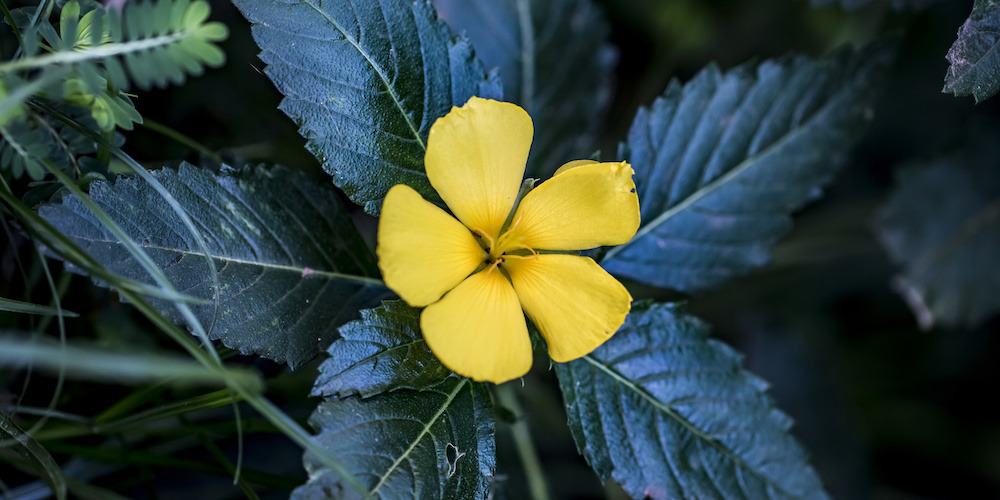BENEFITS OF DAMIANA
✓ Improves sexual activity
✓ Supports the nervous system
✓ Reduces blood sugar levels
✓ Potentially anti-cancer
✓ Enhances physical abilities
What is damiana?
Damiana’s scientific name is Turnera diffusa. Native to America, it grows wild in tropical areas of Mexico, the Caribbean, and some regions of the United States (Texas, California…). It is also found in India and Africa, in areas where the climate is warm and humid.
Damiana is a shrub belonging to the Passifloraceae family, which includes over 600 different species, all native to tropical areas. The Turnera genus alone has about a hundred species, including the one of interest here: Turnera diffusa. The ‘real’ damiana should not be confused with Caribbean damiana (Turnera ulmifolia), which does not have medicinal properties.
Capable of reaching 2 meters in height, it has a thick and hairy root. Its long leaves, pale green in color, are very aromatic. From July to October, the shrub is adorned with beautiful yellow flowers that, once wilted, give way to small edible fruits. It is during this period, after flowering, that the leaves are harvested.
Indeed, these are the parts that contain the active ingredients and are used in herbal medicine. They are particularly rich in essential oils, damianin, flavonoids, and tannins.
Once harvested, damiana leaves can be dried for consumption in infusion. It is also reported that they were used in the preparation of an aphrodisiac herbal drink consumed by indigenous peoples of Mexico, including the Mayans. In Mexican popular culture, it is also mixed with tequila to prepare love potions!
In addition to its effect on sexuality, it was traditionally used to strengthen the body, relieve menstrual problems, and combat anxiety.
Today, dried damiana leaves are available directly in sachets or as dietary supplements (tablets, capsules, or mother tinctures). Demand is increasingly strong. This growth is driven by recent scientific findings, which, in addition to confirming the aphrodisiac effects of damiana, have highlighted other benefits of the plant.
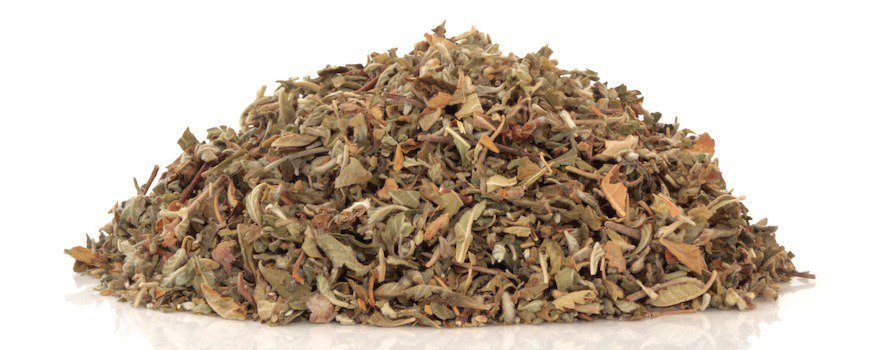
Nutritional Composition
- Proteins
- Glucosides: arbutin, tetraphylline
- Flavonoids: damianin, apigenin, echinacin, pinocembrin, acacetin
- Phytosterols
- Saccharides
- Terpenoids: teuhetenone A
- Caffeine
- Resins
- Gums
- Tannins
- Starch
- Essential oils: ettacadiène, thymol, cineol
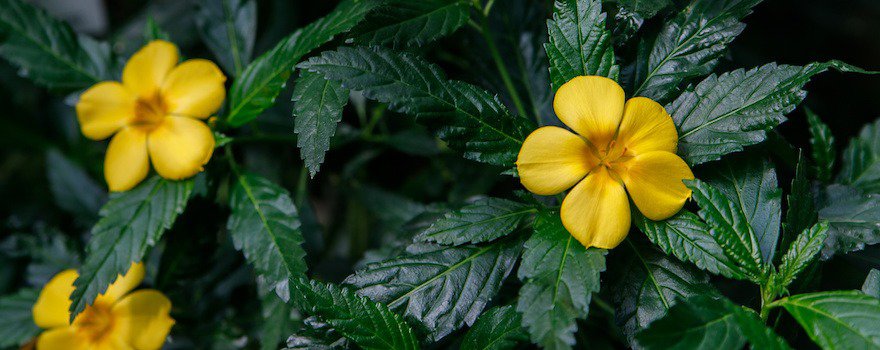
The benefits of damiana
🔥 Improves sexual activity
Damiana has long been used in traditional medicine to improve sexual activity. On one hand, it enhances desire, increases energy in both men and women, and improves recovery after sexual activity. On the other, it fights against sexual disorders, such as impotence, erection problems, premature ejaculation, frigidity…
The aphrodisiac effect of damiana is due to the flavonoids in its leaves. Pinocembrin and acacetin are natural substances that inhibit the activity of aromatase. This enzyme converts testosterone into estrogens. By limiting this conversion, it increases testosterone levels, thus improving sexuality.
Flavonoids and alkaloids also promote good blood circulation in the genital organs. Furthermore, they reduce stress and anxiety, which are responsible for many sexual disorders.
Other active ingredients of damiana contribute to improving sexuality. Caffeine, for example, is a natural tonic that reduces erectile dysfunction, facilitates blood flow, and promotes muscle relaxation in the penis. Numerous studies have confirmed the benefits of damiana on sexual activity.
This study from the University of Mississippi, conducted in a lab, shows how flavonoids significantly suppress aromatase activity.
This other study from the Ramón de la Fuente Muñiz National Institute of Psychiatry in Mexico, conducted on men, demonstrates the aphrodisiac activity of damiana.
🙏 Supports the nervous system
Damiana is among the adaptogenic plants like ginseng, maca, rhodiola, and astragalus. These plants have the ability to improve the body’s resistance in the face of stress and anxiety. They act on the adrenal glands located above each kidney. These glands participate in the release of certain hormones, including cortisol, the stress hormone.
Cortisol is essential for supporting the nervous system. Contrary to what one might think, it helps control stress. By supporting the functioning of the adrenal glands, damiana helps us better react in stressful situations.
Apigenin, one of the flavonoids found in the leaves, also has an anxiolytic effect: it relieves anxiety, promotes calmness, and relaxation. Damiana is thus valuable in cases of stress, anxiety, nervous fatigue, overwork, or mild depression.
This study from Panjab University in Chandigarh, India, conducted on mice, demonstrates the sedative, anti-stress, and anti-depressive activity of apigenin.
🍭 Reduces blood sugar
Damiana is among the hypoglycemic plants, capable of lowering blood sugar levels. Its action is due to the terpenoids it contains, specifically teuhéténone A.
Like medicinal antidiabetics, this natural molecule inhibits the activity of alpha-glucosidase and prevents the digestion of carbohydrates. Therefore, this plant may be interesting for diabetic individuals.
This study from various Mexican universities, conducted on mice, shows that teuhéténone A extracted from damiana has an activity comparable to insulin. Its hypoglycemic effect is even superior to that of glibenclamide, an antidiabetic drug used against type 2 diabetes.
🔬 Potentially anti-cancer
Several studies have demonstrated the potential of damiana in the fight against cancer. Indeed, some of its compounds have a cytotoxic effect on cancer cells: they inhibit their development and can even destroy them.
Once again, it is apigenin that is responsible for this activity. It can induce apoptosis (programmed cell death) and necrosis (death and decomposition) of certain cancer cells.
This study from the National Polytechnic Institute of Mexico, conducted on tumor cell lines, demonstrates for the first time the cytotoxic effect of damiana on cancer cells in cases of breast cancer.
⚡️ Improves physical abilities
Thanks to different active compounds, damiana improves physical abilities. It is an excellent natural tonic that increases energy and physical endurance. It is an interesting plant in cases of fatigue, weakness, lethargy, or in the context of sports practice.
Partly, these properties are due to the increase in testosterone levels in the blood via flavonoids. Indeed, testosterone is not only a sex hormone but also the hormone of physical energy, strength, and muscle gain.
Moreover, this plant boosts the production of red blood cells, thus improving recovery, oxygen transport, and muscle power.
Finally, the apigenin in damiana exercises an analgesic effect that alleviates pain in case of injuries, muscle tears…
Further studies are still needed to evaluate the efficacy of damiana in enhancing physical performance.

How to consume damiana?
Dried Leaves
The dried leaves can be sold directly in bulk or in bags. This is an interesting form to consume damiana as an infusion. Preferably choose damiana grown organically.
To make a damiana tea, steep the equivalent of a level teaspoon per cup in hot water for 10 minutes. Once filtered, your infusion is ready.
In Tablets
Damiana leaves have a rather strong and slightly bitter taste. To avoid this taste, you can opt for tablets or capsules containing leaf powder of damiana. This is a form that you can easily find in organic and specialized stores or online.
The capsules or tablets should be sufficiently concentrated in damiana. Choosing a 4/1 ratio (meaning a single 500 mg capsule is equivalent to 2000 mg of damiana leaves) is beneficial to take advantage of the plant’s benefits.
In Powder Form
Damiana can also be consumed in powder form. After harvest, the leaves are dried and then ground into powder.
Preferably choose pure powder, from plants grown organically, non-ionized, and without preservatives. Damiana powder can be mixed with water, fruit juice, a smoothie, yogurt…
As Mother Tincture
It is possible to find mother tincture of damiana, obtained by hydro-alcoholic maceration of fresh leaves. This form of dietary supplement is often very rich in active ingredients but has the disadvantage of containing a substantial amount of alcohol.
It is advisable to choose a certified organic mother tincture whose plants have been harvested in the wild, away from potential pollution.
Damiana and Aphrodisiac Plants
Pairing damiana with maca (Lepidium meyenii) is interesting to enhance its aphrodisiac activity. Nicknamed the “Peruvian viagra”, maca is an energizing plant that boosts libido, combats erectile dysfunction, and stimulates fertility.
The aphrodisiac effect of damiana is also amplified when associated with cordyceps (Ophiocordyceps sinensis), tribulus (Tribulus terrestris), or ginseng (Panax ginseng).
To improve mental well-being, reduce stress and anxiety, damiana can be paired with griffonia (Griffonia simplicifolia), rhodiola, or kudzu (Pueraria montana).
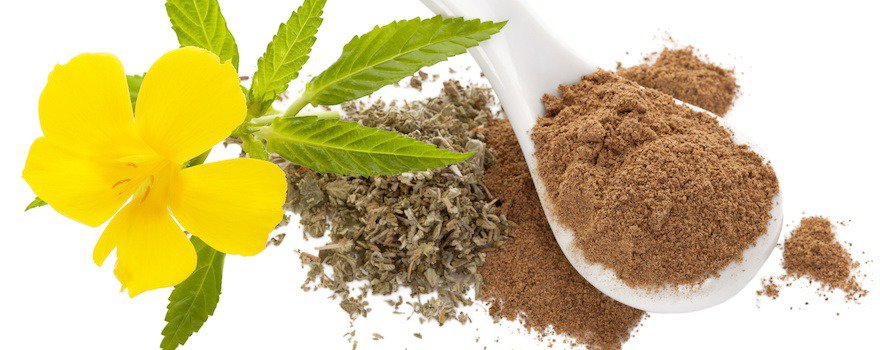
Dosage
⚖️ The recommended dosage is between 800 and 2000 mg per day. It takes several weeks to start seeing the first effects.
⏳Dosage is spread out over the day, preferably with meals. However, avoid consuming damiana late in the day as it may interfere with falling asleep.
⏳ Damiana is particularly beneficial when taken in long courses. 2 to 3 months courses work deeply to improve sexual health and regain mental well-being. Take breaks of a few weeks between each course.
🍃 As dried leaves : 1 level teaspoon per cup per day.
💊 In tablets : up to 5 per day for 400 mg capsules.
🥄 As powder : 1 level teaspoon per day.
🧪 As mother tincture : 1 teaspoon, 3 times a day.
Contraindications and Side Effects
Even though damiana is often well tolerated by the body, its consumption has certain contraindications. Thus, it is not recommended for the following people:
- As a precaution, young children, pregnant, or breastfeeding women should avoid taking damiana.
- Consumption of damiana is not recommended for people suffering from iron deficiency, hypoglycemia, liver, kidney or urinary tract diseases, or prostate enlargement.
- People under medication or with a history of breast cancer should consult their doctor before consuming it.
Taking damiana may cause some side effects, which are generally mild. The following side effects have been reported:
- Insomnia.
- Headaches.
- Nausea.
- Laxative effect.
- Increased urine output.
- Gastrointestinal disorders.
If symptoms persist, stop your consumption and consult a doctor. In high doses, damiana may cause kidney and liver damage.
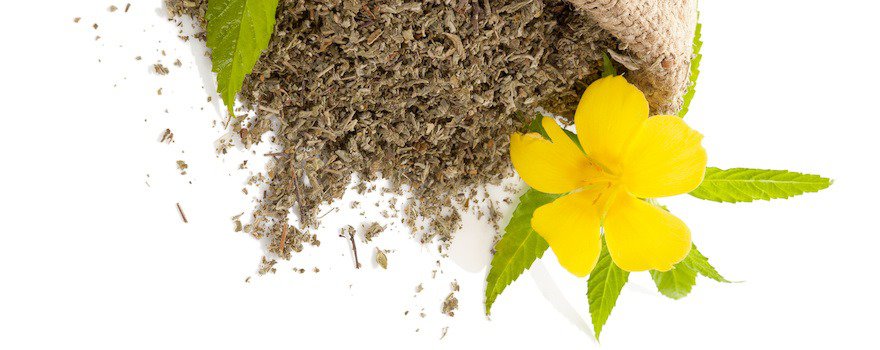
History, Culture, and Market
Damiana is a plant consumed since ancient times. Used by indigenous peoples, it was reportedly first documented by Father Juan Maria de Salvatierra. This Spanish missionary, sent to Mexico in 1675, noted that damiana leaves were mixed with sugar and consumed for their aphrodisiac properties.
Over the centuries, the leaves have been the subject of other uses. In 1885, they were used in the preparation of the ancestor of Coca-Cola, the “French Wine Coca“, based on alcohol, coca, kola nut, and damiana. The Mayans could also burn the leaves as incense. In Mexico, they are still used today to make a traditional liquor based on Mexican plants.
It was ultimately the hippie movement that brought damiana back into vogue in the 60s. Its leaves were then smoked for their relaxing and slightly euphoric effect.
Today, it is mainly consumed as a dietary supplement and is an ingredient in many aphrodisiac products.
File prepared by Julia Perez and Charlotte Jean
Sources and Scientific Studies
Zhao J, Dasmahapatra AK, Khan SI, Khan IA, 2008. Anti-aromatase activity of the constituents from damiana (Turnera diffusa).
R. Estrada-Reyes, P. Ortiz-López, J. Gutiérrez-Ortíz, L. Martínez-Mota, 2009. Turnera diffusa Wild (Turneraceae) recovers sexual behavior in sexually exhausted males.
S. Kumar, R. Madaan, and A. Sharma, 2008. Pharmacological evaluation of Bioactive Principle of Turnera aphrodisiaca
Aída Parra-Naranjo, Cecilia Delgado-Montemayor, Alejandra Fraga-López, Gabriela Castañeda-Corral, Ricardo Salazar-Aranda, Juan José Acevedo-Fernández, and Noemi Waksman, 2017. Acute Hypoglycemic and Antidiabetic Effect of Teuhetenone A Isolated from Turnera diffusa.
María del Carmen Avelino-Flores, María del Carmen Cruz-López, Fabiola E. Jiménez-Montejo, and Julio Reyes-Leyva, 2015. Cytotoxic Activity of the Methanolic Extract of Turnera diffusa Willd on Breast Cancer Cells.


